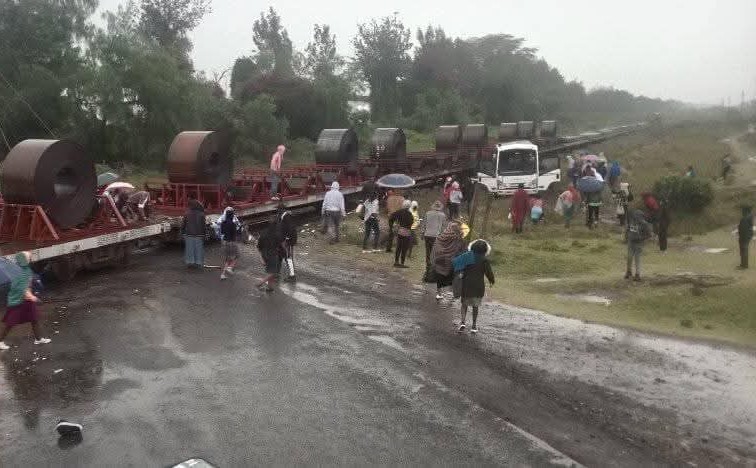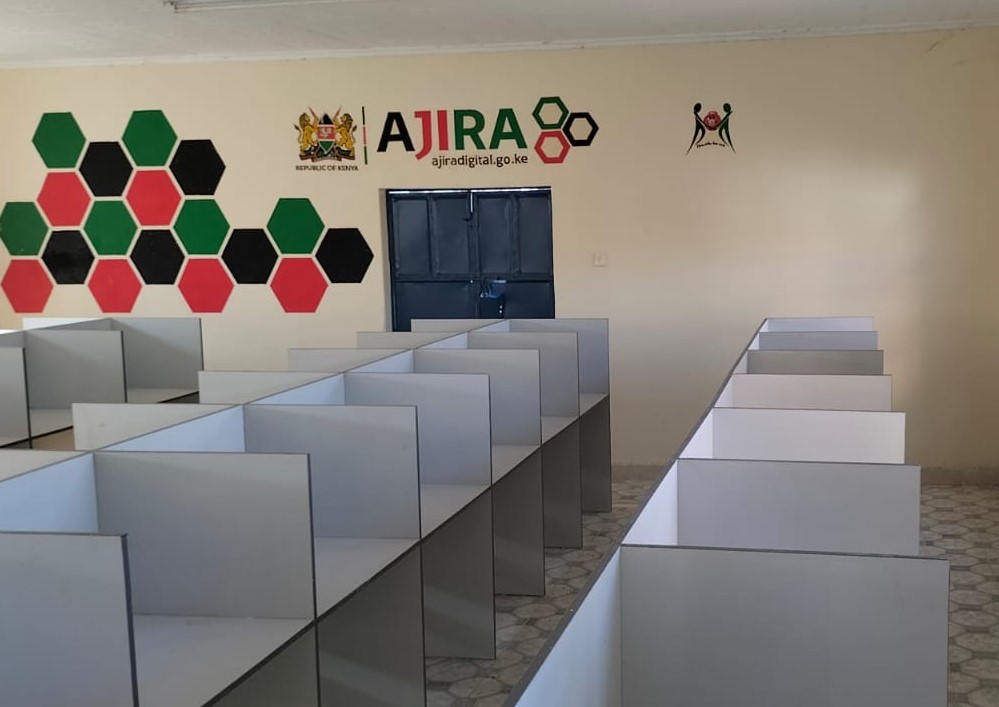Life behind the load: The hard road travelled by mkokoteni pushers
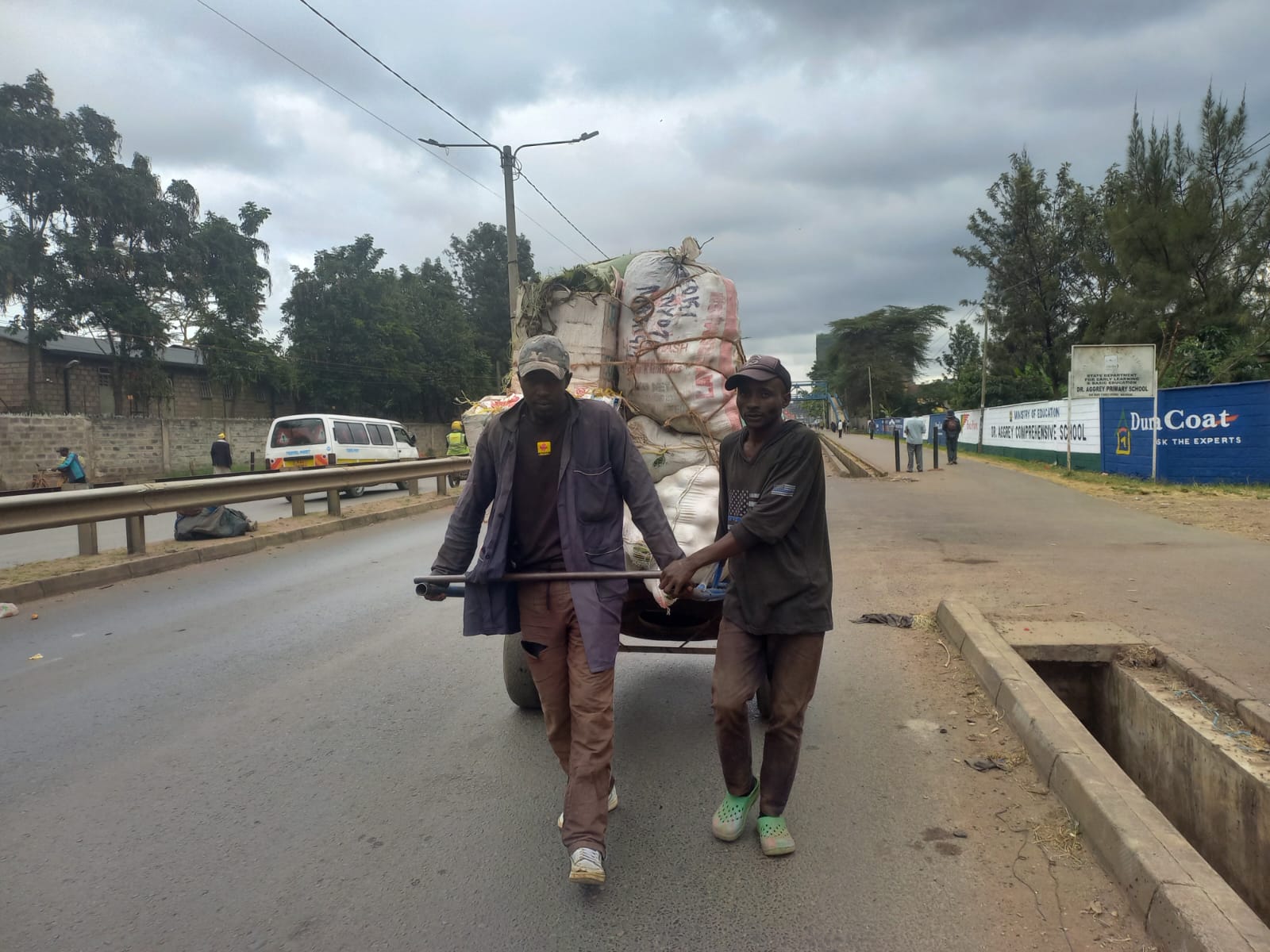
As they packed towering stacks of fruits and vegetables into a cart, the pace of life around them was fast and unrelenting. “Time is money here,” Esther Wanjiru, a nearby trader, told me.
Today was no ordinary commute. As I made my way to work, fate intervened. A traffic snarl-up along Thika Road rerouted my matatu through Ngara instead of the usual Pangani shortcut.
Delays pushed me into the city centre, and needing a quick energy boost, I stopped to buy a few oranges at Marikiti Market.
More To Read
- Court hears how police surveillance systems tracked suspects in Ahmed Rashid murder case
- Residents demand action as borehole drilling company renders Yusuf Haji Avenue impassable
- Safaricom’s Ndoto Zetu initiative elevates maternal health in Kamukunji's Eastleigh with bed donation
- Eastleigh residents slam City Hall over shoddy repairs on Athumani Kipanga Street, demand permanent fix
- Mahiza Cafe and Bakery: Eastleigh’s chocolate and dessert factory serving pistachio dreams, boba, and halal elegance
- How Eastleigh rewrote its colonial name into a Kenyan-Somali powerhouse
It was here that I met Amos Ngao, 42, and Kennedy Kamande, 33 – two men deep in the physically gruelling and often overlooked business of handcart (mkokoteni) pushing.
As they packed towering stacks of fruits and vegetables into a cart, the pace of life around them was fast and unrelenting.
“Time is money here,” Esther Wanjiru, a nearby trader, told me.
Curious, I approached the two men. Their handcart was destined for a restaurant in Eastleigh, and rather than hop onto a matatu, I decided to walk with them. I wanted to understand a world that exists in plain sight yet remains unseen.
Just as they were finishing up, we were joined by a third man, Brian Kariuki, who would help push the cart up to the Kariokor roundabout before returning to the market. The cart was filled with watermelons, bananas, avocados and tomatoes.
The client, a Somali businessman who preferred anonymity and introduced himself only as Abdi Kadir, waited on the other end, clad in a brown kanzu.
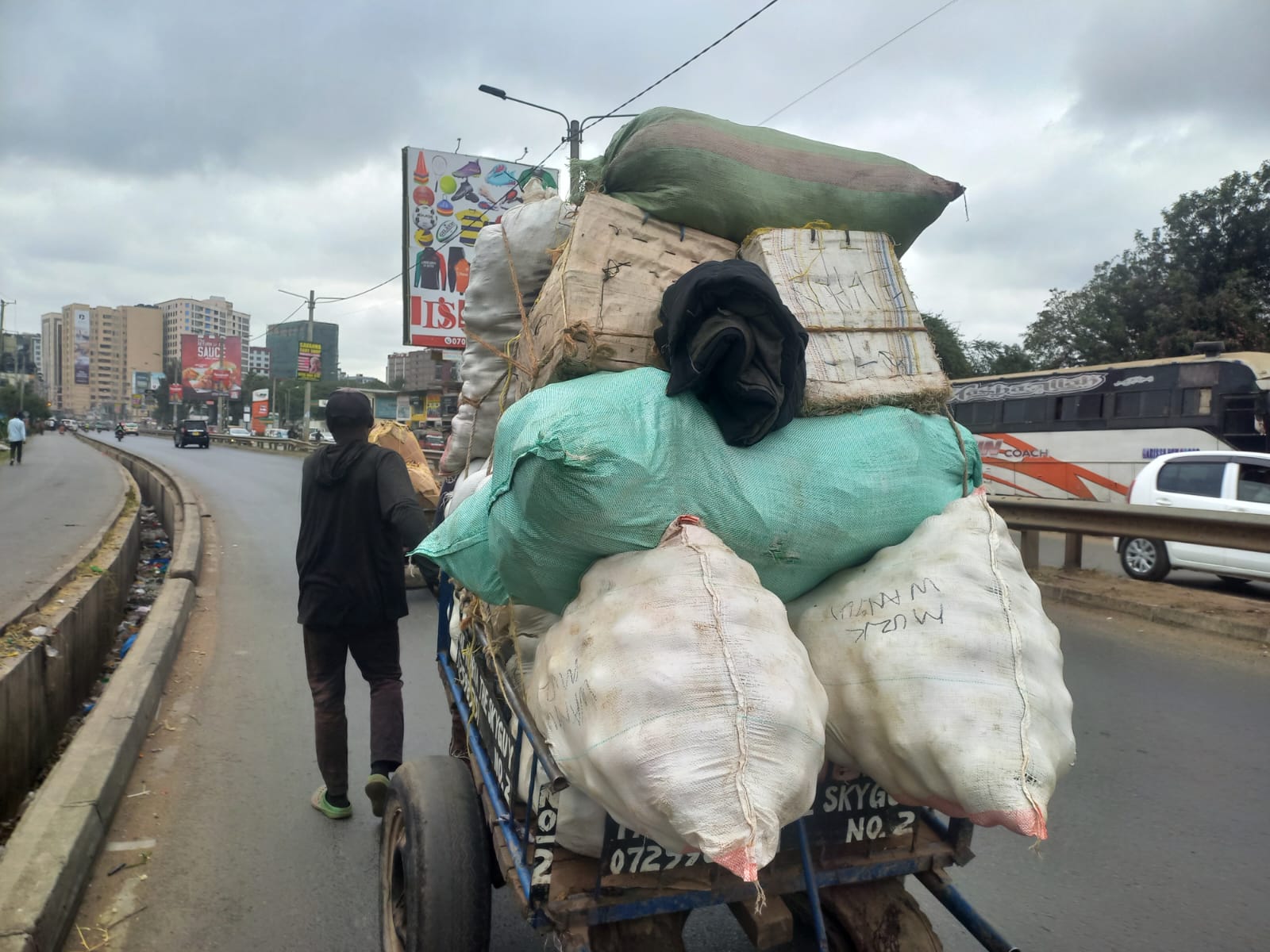 Amos Ngao, 42, and Kennedy Kamande, 33, pushing the cart. (Margaret Wanjiru)
Amos Ngao, 42, and Kennedy Kamande, 33, pushing the cart. (Margaret Wanjiru)
Once loaded, we set off on the nearly five-kilometre trek to Eastleigh, navigating Nairobi’s heat, potholes, and traffic. This was more than physical labour; it was coordination, intuition, and sheer willpower in motion.
Kamande, the primary “driver” of the cart, maintained a steely focus, his eyes scanning the uneven road with unwavering concentration. Every step was measured and deliberate—one misstep could cause serious injury or spill their precious cargo.
His body, lean but powerful from years of relentless work, moved with the rhythm of a man who knew this route like the back of his hand.
Walking closely beside him was Ngao, sweat beading on his forehead and trailing down the sides of his weathered face. His hands, rough and calloused, gripped the cart with practised ease.
“This is our hustle,” Kamande said. “It’s not just a job. It’s what puts food on the table for my family.”
He has been pushing a mkokoteni since 2015. It’s not formal employment, but it is gruelling, unrelenting labour—no amount of gym training prepared me for the brutal reality of pushing a heavy cart through Nairobi’s chaotic streets.
The physical and mental toll
Dressed neatly, I noticed the stares. People assumed I didn’t belong. It’s as though hard work can only be respectable if done in worn-out clothes. But here, strength and resilience matter more than appearance.
The job, as Ngao explained, demands speed, teamwork, and immense physical stamina.
“Sometimes we walk five kilometres with 800 kilograms or more. You must use your mouth as a horn, your brain for direction, your hands for balance, and your feet as the engine,” he added.
Each cart is rented daily, often for Sh100, from known local owners. Since Nairobi City County bans the use of animals like donkeys for transporting goods within the CBD, humans now bear the burden, making mkokoteni pushing a vital but demanding occupation.
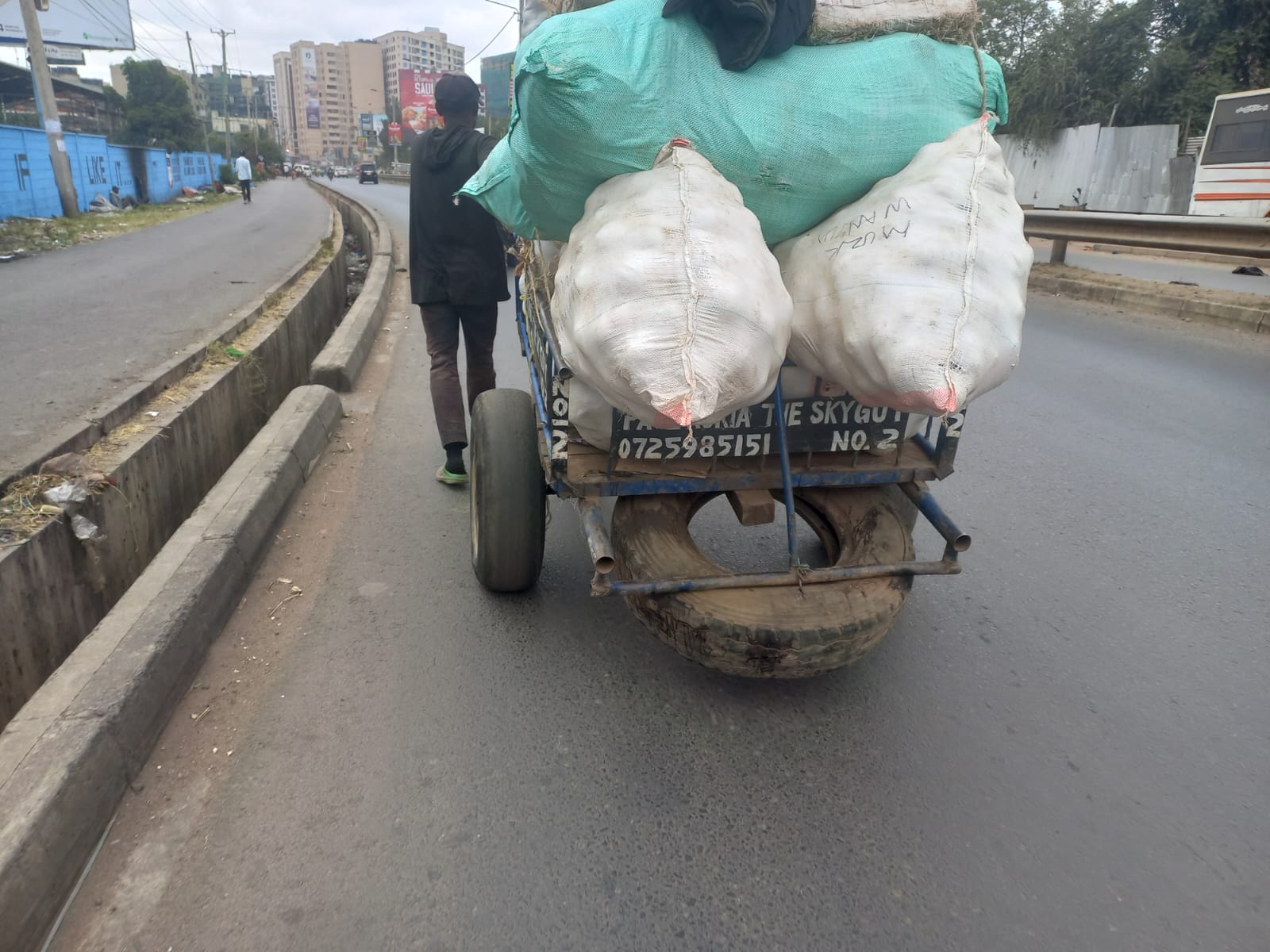 Amos Ngao, 42, and Kennedy Kamande, 33, pushing the cart. (Margaret Wanjiru)
Amos Ngao, 42, and Kennedy Kamande, 33, pushing the cart. (Margaret Wanjiru)
Trust is key. Some have vanished with the carts, leaving owners at a loss. This has fostered a tight-knit culture where reputation determines whether you’ll be trusted with a cart.
Earnings vary widely. A good day might bring in Sh1,000–1,500 from multiple deliveries. A bad day means nothing.
“The person pushing the cart is paid per delivery,” said Ngao. “He then shares the pay with helpers depending on the load, distance, and effort.”
Despite the unpredictability, Kamande, a father of three, relies on this work to support his family. School fees and savings are his top priorities.
Road hazards and risk
As Ngao was explaining the dangers they face, a motorist on his phone swerved too close and bumped the cart from behind. They leapt to steady it.
“That happens all the time,” Ngao sighed. “We deal with drivers who don’t respect us, speeding past without a glance. Pedestrians ignore us. We’re invisible.”
The work is not only exhausting but also hazardous. The metal bars holding goods can snap, injuring limbs. Uneven terrain, tight deadlines, and careless motorists make every trip a risky affair.
Ngao recalled a friend injured near Gikomba after a cart’s metal bar broke loose and smashed his foot. The man is still recovering.
“I have two friends in the hospital right now; one with a broken leg, another with fractured hands. This job doesn’t forgive mistakes.”
These men aren’t just moving mangoes. They transport electronics, furniture, poultry, construction materials, and sometimes people during floods.
That day, they were delivering to several hotels in Eastleigh. Another cart nearby carried spices, flour, and kitchen produce.
Kamande explained that some apartment complexes organise bulk deliveries from the market. Once the goods arrive in Eastleigh, the complex management contracts mkokoteni pushers to deliver them door to door.
“We are essential workers,” Kamande said. “But society doesn’t treat us that way.”
Police harassment, theft, and extortion are part of their daily reality. And the actions of a few rogue pushers have tainted the reputation of many honest ones.
Respect and dignity on the streets
If there’s one thing these men want Kenyans to know, it’s this: cart pushers are human.
“Treat us with respect. We’re not here to block traffic. We’re working hard like everyone else. I am also a vehicle, powered by hands and feet instead of an engine,” Kamande says.
To fellow pushers, the message is simple: “Stay honest. Stay strong. Help each other. This job is hard, but together, we can survive it.”
Even rain doesn’t stop deliveries. Tarpaulins cover the goods. Tomatoes, potatoes, and mangoes must not spoil.
“The customer won’t pay if things are damaged. So even in heavy rain, we walk. There’s no waiting it out.”
By the time we reached Muslim Primary School near Eastleigh, my legs were sore and my face dripping with sweat, and I was only walking beside them.
The men barely slowed. For them, it was just one of many trips that day, working from 5 am to 5 pm, six days a week.
“That’s why Kamande is silent most of the time,” Ngao explained. “He must focus. I help with balancing and steering.”
As we parted ways, I realised: this was more than a delivery. It was a lesson in resilience, dignity, and the invisible backbone of Nairobi’s economy.
Top Stories Today


